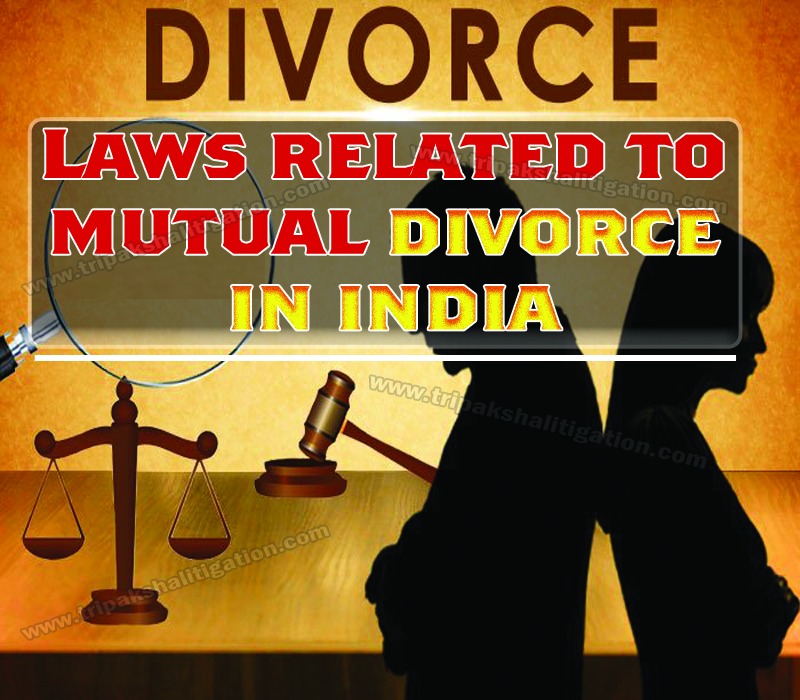“Divorce by Mutual Consent, as the name proposes, implies when both Husband and wife concur genially among themselves that they can’t live respectively any longer and that the best arrangement is to Divorce, without advancing any charges against one another, in the court of law, at that point such a Divorce petition introduced jointly before the Hon’ble Court is Known as Mutual Divorce”.
LAWS UNDER DIFFERENT RELIGIONS
“Every religion is governed by different laws related to divorce. Hindus (which includes Sikhs, Jains, and Buddhists) are governed by Hindu Marriage Act, 1955. Muslims are governed by The Muslim Women (Protection of Rights on Divorce) Act, 1986 and Personnel laws of Divorce and also the Dissolution of Marriage Act, 1939. Christians are governed by The Indian Christian Marriage Act, 1872 and Indian Divorce Act, 1869. Similarly, Parsis are governed by The Parsi Marriage & Divorce Act, 1936. And there is also another secular law called Special Marriage Act, 1954.”
The laws for Mutual Divorce for different religions are as follows:
HINDU MARRIAGE (INCLUDES SIKHS, JAINS, BUDDHIST)
“Divorce by mutual consent is given under Section 13B of the Hindu Marriage Act, 1955. After the recording of the petition the court allows a six-month alarming period. The Supreme Court concluded that if the marriage is by all accounts totally irreparable waiving off can be done of this period. When this period is passed, the second motion is recorded and the court grants decree of divorce. “
1. PETITION
The first step is a joint petition for dissolution of marriage for a decree of Divorce is to be introduced to the family court by both the companions on the ground expressing that they have not had the option to live respectively and have commonly consented to break down the marriage or they have been living separately for a time of one year or more. It should be signed by both the parties.
2. APPEARANCE BEFORE THE COURT
- The Husband and Wife have to be present before the family court after the filing of the petition and the parties would present their respective lawyers.
- The court will observe the petition along with the documents.
- The court may even endeavour to reconcile the couple, be that as it may, if this is not possible, the issue continues for additional subsequent meet-ups.
3. PASSING ORDERS
After the petition is critically observed by the court and it satisfies, it may order the party’s statements to be recorded on oath.
4. FIRST MOTION
- Once the statements are recorded, an order on the first motion is passed by the court.
- After this, a six months period is given to both the parties to a divorce, before they can file the second motion.
- The maximum period to file for a second motion is 18 months from the date of presentation of the divorce petition in the family court.
5. SECOND MOTION
When the parties have chosen to go further with the proceedings and appear for the second motion, they can proceed with the final hearings.
6. DIVORCE DECREE
In a mutual divorce, both parties must have given consent and there shall not be any differences left in the matters related to contentions regarding alimony, custody of a child, maintenance etc. Thus, there needs to be complete agreement between the spouses for the final decision on the dissolution of marriage. If the court is satisfied after hearing the parties that the allegations in the petition are true and that there cannot be any possibility of reconciliation and cohabitation, it can pass a decree of divorce declaring the marriage to be dissolved. The divorce becomes final once the decree of divorce has been passed by the court.
MUSLIM MARRIAGE
“In Islamic Divorce through Mutual Consent, there are two different ways to get separated or break down the marriage. One is the “Khula” Divorce and the other is “Mubarat” Divorce Form. In both these ways, spouse consents to relinquish her dower or some piece of some other property. For a situation of Mutual Divorce in Muslim Law, the spouse needs to pay some measure of the remuneration for dissolving the marriage and getting separated.”
KHULA
Under this form the wife gives consideration to the husband about her separation from the union of marriage. Also the one kind of a consideration is leaving the husband from making the payment of Mahr to the wife.
Mubarat
Under this method of divorce under the Islamic law, both wife and husband are not ready to live together anymore and get separated as soon as possible dissolving the marriage.
There are some conditions to seek Mubarat form of Divorce. They are as follows:
- The husband or the wife, either of them can make the offer.
- The other spouse must need to accept the divorce proposal.
- Once it is accepted by the other partner, it becomes irremediable.
- Iddat period is mandatory before the divorce is approved.
If we talk about Sunnis, when the husband and the wife opt for mubarat then all of their mutual rights and obligations becomes meaningless and comes to an end. In case of Shias, they insist on a proper documental form. The Shias believe that the word mubarat must be followed by the word Talaq, otherwise the divorce is meaningless.
In both, Shias and Sunnis, mubarat (mutual consent divorce) is irreparable. Other requirements are as same as what are in khula and the wife must have to follow the period of iddat and in both these ways, a divorce is basically an act of both the partners and thus, no intervention by the court is entertained.
CHRISTIAN MARRIAGE
“Divorce for Christians is governed by Indian Divorce Act 1869 in India. Dissolution of marriage by way of mutual consent has been given under Section 10A of the Act. The petition for mutual divorce can be filed by both the parties in the District Court having Jurisdiction.”
The grounds for the petition are as follows:
(a) That the parties have been living separately for more than a year
(b) Cohabitation between the parties is not possible.
(c) That the decision to dissolve the marriage is a mutual decision of both the parties
The petition can be withdrawn after 6 months from the date of presentation of the mutual divorce petition, but before a lapse of 18 months from such date.
PARSI MARRIAGE
“Divorce for Parsis is governed by the Parsi Marriage and Divorce Act, 1936. Section 32B of the said Act lays down the rules for mutual divorce. Conditions that are required to be fulfilled in order to be able to get a mutual divorce decree from the Court:”
(a) It is compulsory to record in the petition the ground that they have been living separately for a period of one year or more
(b) Also to mention that they have not been able to live together, and
(c) The petition should state that they have mutually agreed that their marriage needs to be dissolved
(d) A petition/suit for mutual divorce can only be filed after the lapse of one year since the date of their marriage
Once the Court is pleased after its inquest, that the marriage had been solemnized under the Parsi Marriage and Divorce Act, that the facts mentioned in the petition are true and the consent of both the parties is there for the mutual divorce without any force or fraud, it would pass a decree of mutual divorce.
CONCLUSION
“The Mutual Divorce laws are different for different religions in India but their gist is same i.e. to end the marriage on mutual basis avoiding any further quarrel between the parties. We can come to the conclusion that Divorce by Mutual consent saves time, money and energy for both the spouses, leaves no room for unnecessary quarrel. With the expanding number of Divorce applications being recorded and the interest for snappy separation expanding, Mutual Consent Divorce is the best choice. It is less expensive as compared to contested form of divorce. There are two aspects on which Husband & Wife have to reach to consensus. One is the alimony or maintenance issues and the next one is Child Custody.”
You may contact me for consultation or advice by visiting Contact Us








